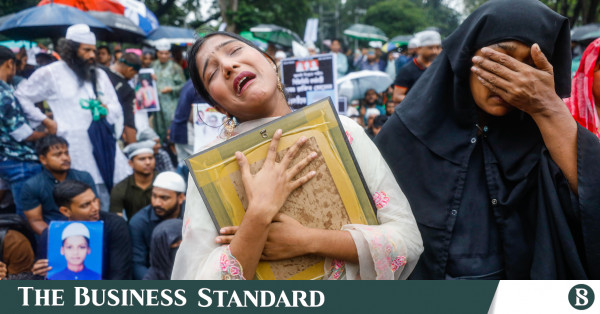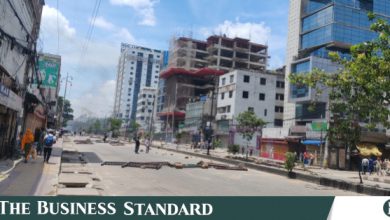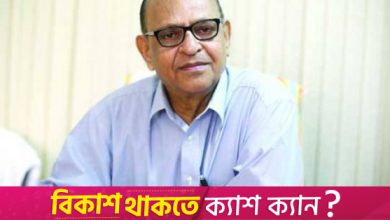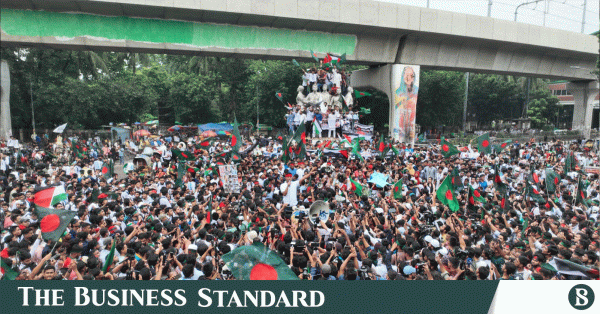July uprising: Memorial gathering resonates with tears, grief for lost ones


The air around the Central Shaheed Minar turned thick with tears and grief on Saturday (14 September) afternoon as families of those killed or injured by law enforcers during the recent student-led mass uprising, as well as victims of forced disappearances or oppression over the last 15 years of Awami League rule, gathered to express their sorrow.
Mohammad Mohiuddin, father of Yeamin, who was killed during the uprising, said, “Nothing is heavier for a father than carrying the burden of a child’s death. May no other parent or sibling have to endure such a heavy burden.”
Yeamin was a fourth-year student at the Mirpur Military Institute of Science and Technology (MIST).
On 18 July, at the peak of the movement, Yeamin was thrown from an armoured police vehicle onto a highway in Savar. Although injured, he was still alive at that time. A video of the incident went viral on social media.
Locals rescued him about an hour later and took him to Enam Medical College Hospital in Savar where attending doctors declared him dead.
“No one should have to witness such a sight — my son being thrown out from a police vehicle. I hope that in the future, the police will carry out their duties properly,” said Yeamin’s father, calling for justice for his son’s murder and recognition of his martyrdom.
The mother of a young man named Himel, who lost both his eyes during a clash in Tangail, said, “I am a poor woman. My son’s eyesight was destroyed by pellets fired by the police. I want justice for my son.”
Ruby Rani Sheel, mother of deceased Liton Chandra Sheel, said, “My son was killed by Hasina, the murderer. I seek justice.”
Sujan, the younger brother of Emon, who was shot by police in Mirzapur, Tangail, recounted, “After being shot, he was taken to a local hospital and later at night on the way to Dhaka, the police stopped our car and brutally tortured him again.”
“I want to see those who killed my brother be hanged for this brutality,” he added.
Rakin Ahmed, son of former BDR chief Major General Shakil Ahmed, who was killed in the 2009 BDR mutiny at Pilkhana, Dhaka, said, “In the past 15 years, Hasina, the dictator and murderer, has been responsible for countless deaths and disappearances. Justice for her every wrongdoing will be served on Bangladeshi soil, God willing.”
The BNP organised this meeting to honour the martyrs of the student-led mass movement.
Braving the rain, BNP leaders began gathering in front of the Shaheed Minar at 2:30pm to participate in the. The rally began with a minute’s silence in memory of the movement’s martyrs.
Following this, artists performed the national anthem, and actors depicted the horrific attacks by government forces during the movement days through stage plays.
Addressing the rally, BNP Secretary General Mirza Fakhrul Islam Alamgir said, “The people of this country have always sacrificed their lives for democracy. When we gained independence in 1971, we hoped that we would build a truly democratic nation. Unfortunately, democracy has been undermined by the Awami League, which claimed to lead the liberation war. In 1975, they established the Baksal regime.”
He continued, “Since coming to power through the 2008 elections, this party has systematically dismantled all state institutions. There has been torture, disappearance, and murder. For 17 years, the people of this country have sacrificed their lives. And in July, many students lost their lives.”
Reflecting on the interim government which was formed after the ouster of the Awami League government on 5 August through mass uprisings, Fakhrul expressed hope that it would help establish a genuine democratic state by ensuring fair elections.
Special care centre demanded for July uprising victims
At a discussion titled “Bangladesh in Their Thoughts,” organised by the group “Guardians Beside Their Children” at the Dhaka Reporters’ Unity (DRU) yesterday, guardians, teachers and injured students have called for the establishment of a government-operated specialised treatment centre, similar to the ones established for COVID patients during the pandemic.
Saif Md Emdad, a student injured in the July uprising, described the immense struggles survivors face due to severe injuries. “Many have lost limbs, eyes, or other vital body parts,” he said.
He highlighted the difficulty of travelling between various hospitals for specialised care, adding, “If a dedicated hospital for the injured existed, we wouldn’t need to go from place to place. A single unit with all specialists is urgently needed.”
Saif, who was shot in both eyes, expressed uncertainty about his recovery but remained resolute. “I don’t know if I will regain my vision, but I have no regrets. I’ve witnessed the agony of the wounded.”
He emphasised the need for timely medical intervention, noting that one of his fellow fighters died 40 days after the movement, and many are losing limbs due to neglect.
During the event, several injured students and their guardians shared their painful memories and the ongoing struggles they are facing.




